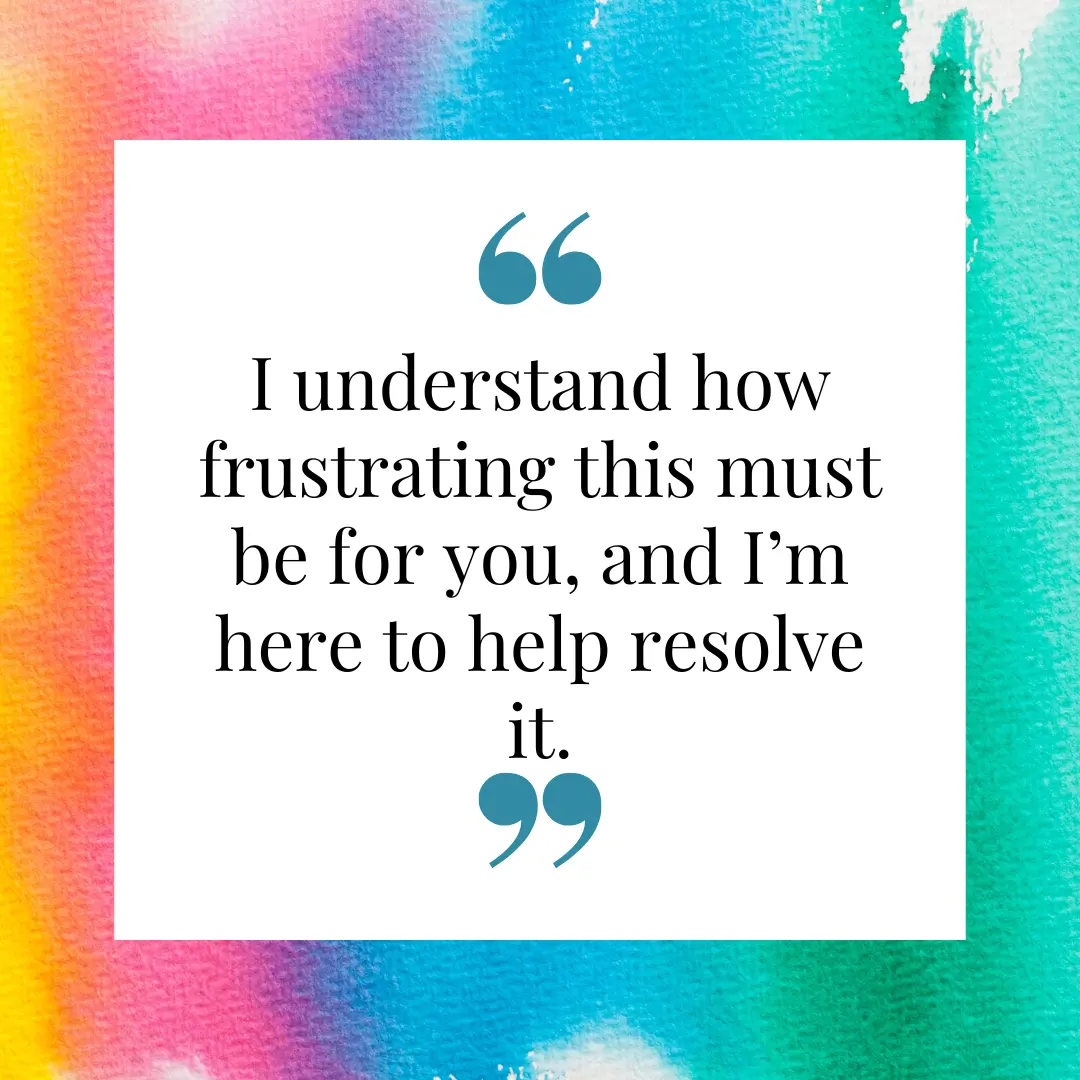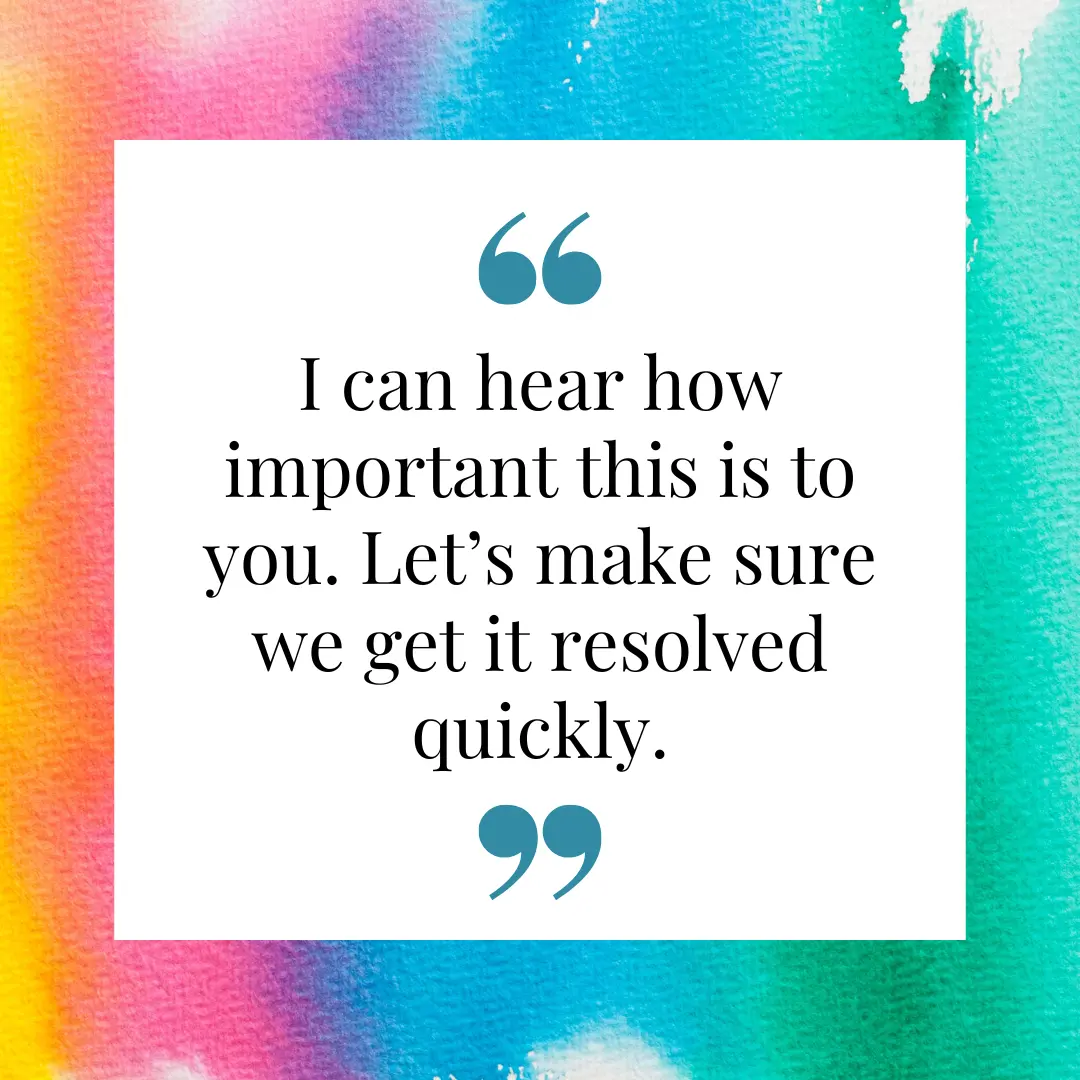35 Popular Empathy Statements for Customer Service (2025)
- June 4, 2020
- 14 mins read
- Listen

Table of Content
Lack of empathy in customer service can leave customers feeling unheard, frustrated, and more likely to switch to competitors. In today’s competitive market, empathy is no longer optional—it’s a necessity. Businesses that prioritize empathy build trust, improve satisfaction, and foster loyalty, ultimately driving higher retention and revenue.
This blog explores 35 powerful empathy statements for customer service to help you turn complaints into opportunities, strengthen relationships, and deliver exceptional customer experiences. Let’s dive into practical examples to enhance your communication skills.
What is Empathy in Customer Service?
In customer service, empathy means being able to understand and share a customer’s feelings by showing genuine care and concern. It is active listening, acknowledgment of emotions, and responding in a manner that makes the customer feel valued and supported. It creates trust, reduces frustration, and increases customer satisfaction.
Why are Empathy Statements for Customer Service Crucial?
Empathy statements will help dissipate tension, leaving room for positive dialogue, and assuring the customers that their issues are important. They help businesses create emotional connections, improve customer retention, and turn negative experiences into loyal relationships.
Empathy Statements to Build Rapport and Trust

Building trust starts with an understanding. You should label the emotions your customer feels; show empathy and assure that you will do everything to solve his problem. Here are some amazing empathy statements for customer service to build trust.
I understand how frustrating this must be for you, and I’m here to help resolve it.
This statement is useful when a customer is facing a complex issue that has caused frustration. It shows you are acknowledging their feelings and offering a resolution, reinforcing your commitment to customer support.
I’m really sorry you’re experiencing this issue. Let’s work together to fix it as quickly as possible.
When customers face a problem, this phrase helps to express empathy and a sense of partnership in resolving the issue. It reassures them that you are aligned with their goal of a fast resolution.
Thank you so much for bringing this to my attention. I appreciate the opportunity to assist you.
This statement shows appreciation for the customer reaching out. It builds rapport by valuing their input and shows that you are ready to help in any way possible.
I completely understand your concern, and I want to make sure we get this sorted out for you right away.
Use this when a customer’s concern requires immediate attention. It conveys understanding and a sense of urgency, reassuring the customer that their issue is a priority.
It sounds like this has been a challenging experience for you. Let me do everything I can to make it right.
This phrase is appropriate when a customer has faced repeated issues or an ongoing challenge. It shows empathy by acknowledging their difficulty and reinforces your commitment to resolve it.
Frustration-handling Empathy Statements

When frustrated, it’s often your calm and sympathetic reply that a customer may need to get them cooled down. Recognize their emotions and apologize for the inconvenience along with a fast solution.
I can see why this would be upsetting. Let’s work together to find the best solution.
Ideal when a customer is frustrated, this statement shows that you understand why they are upset and assures them that you are actively working toward a solution.
I’m really sorry this has caused you inconvenience. I’ll make sure this gets fixed as soon as possible.
This apology shows empathy for the inconvenience and assures the customer that fixing the issue is your top priority, offering a quick resolution.
I know this situation is not ideal, and I sincerely apologize for any inconvenience. Let’s make it right.
This phrase works well when customers are experiencing something less than ideal. It expresses empathy by acknowledging the issue and offers a path forward to fix it.
Your feelings about this situation are completely valid. I’ll take care of this for you right away.
This statement validates the customer’s emotions and reassures them that their feelings are heard and understood, which helps diffuse frustration.
I’m really sorry you had to deal with this. Thank you for your patience while we fix it.
A good choice when a customer has been patient through a tough situation. It shows gratitude and empathy for their patience while assuring them that the issue is being resolved.
Active Listening Empathy Statements

Service is about listening. Prove it by summarizing their concerns and asking for clarification to ensure you’re on the same page.
I can hear how important this is to you. Let’s make sure we get it resolved quickly.
This statement is used when a customer expresses the importance of an issue. It shows active listening by acknowledging their priority, while also focusing on resolving the problem swiftly.
It sounds like this has been quite a hassle. I appreciate you explaining everything in detail.
When customers explain a complex issue, this phrase acknowledges their effort and makes them feel heard and appreciated. It builds trust by showing attentiveness.
I’m taking notes as we speak to ensure nothing is overlooked. I want to get this right for you.
This is ideal when dealing with intricate issues. It demonstrates thoroughness and assures the customer that every detail is being recorded and addressed.
I appreciate your patience as we work through this together. I’m here to make things easier for you.
When issues take time to resolve, this statement shows empathy by acknowledging the customer’s patience and emphasizing your role in simplifying the process.
Thanks for explaining that clearly. Let me double-check the details so we don’t miss anything.
Ideal when customers provide a detailed explanation, this phrase shows gratitude and ensures the customer’s concerns are accurately addressed.
Reassurance Empathy Statements

Reassure customers that you are committed to a resolution. Clearly state the next steps and then follow through to help them gain confidence in your support.
You’re in good hands—I’ll make sure we get this resolved properly.
This phrase reassures a customer that they are receiving expert attention and that their issue will be addressed with care and precision.
I’ll personally follow up to make sure this issue is completely resolved.
When a resolution requires multiple steps, this statement offers reassurance that the customer will receive ongoing attention, reinforcing a sense of personal care.
I want to make sure this doesn’t happen again. We’ll look into it immediately.
This statement shows a proactive approach by assuring the customer that the issue is being thoroughly investigated to prevent future occurrences.
Rest assured, I’ll do my best to keep you updated every step of the way.
This phrase is used when customers need constant updates. It assures them that they will be informed regularly and involved in the process.
I’m committed to helping you through this until we find a solution.
This reinforces your dedication to the customer’s issue, letting them know you won’t stop until the problem is solved.
Empathy Statements to Offer Solutions

Providing solutions is all about making life easy. Present clear, personalized options to solve their problem and guide them through it step by step.
I can suggest a few options to resolve this—let’s find the one that works best for you.
This statement presents flexibility by offering several potential solutions and collaborating with the customer to find the most effective one.
I’m happy to walk you through the process step-by-step to make this easier.
Use this when the customer needs guidance through a process. It shows a willingness to break down the steps to ensure the customer feels supported.
Let’s troubleshoot this together to find the quickest solution.
This phrase invites the customer to collaborate in solving the issue quickly, making them feel involved and reducing any anxiety.
I’ll make sure we escalate this to the right team so it gets resolved quickly.
When an issue requires further expertise, this statement reassures the customer that the right people are being involved to speed up the resolution.
Let’s look at some alternatives and see what works best for your situation.
This offers flexibility, showing the customer that their situation is unique and that you are exploring all possible alternatives to find the best fit.
Empathy Statements of Appreciation

Appreciation goes a long way. Thank your customers for their patience, understanding, and feedback, and assure them that you value their time and trust.
Thank you for taking the time to reach out. Your feedback helps us improve.
This shows appreciation for the customer’s input and reinforces that their feedback is valuable and leads to improvements.
I appreciate your patience as we work through this. Thank you for being so understanding.
This statement is ideal for thanking the customer for their understanding and patience, which helps to strengthen the relationship.
Thank you for giving us the chance to make this right for you.
This expresses gratitude for the opportunity to rectify the situation, highlighting your commitment to customer satisfaction.
I’m grateful for your time today and for letting us help you.
This phrase is an effective way to show gratitude for the customer’s time and trust in your service.
We really appreciate your loyalty and are committed to keeping you satisfied.
Ideal for long-term customers, this statement emphasizes your appreciation for their continued business and commitment to providing top-notch service.
I can imagine how stressful this situation must be for you. Let me take care of it right away so you can focus on what matters.
This phrase acknowledges the customer’s stress and reassures them that you’re taking immediate action to resolve the issue, providing a sense of relief.
I completely understand your disappointment, and I’ll do everything I can to make sure this doesn’t happen again.
This statement validates the customer’s emotions and emphasizes your commitment to preventing similar issues from recurring, which builds trust.
I know this isn’t the experience you were hoping for, and I appreciate your patience while we work on fixing it.
This phrase recognizes the customer’s dissatisfaction while also showing appreciation for their patience, which fosters goodwill.
Thank you for your understanding. I’ll make sure to update you regularly so you’re always in the loop.
By thanking the customer and offering consistent updates, you reassure them that they won’t be left in the dark during the resolution process.
I can see how important this is to you, and I want to make sure we get it right. Let’s work through this together.
This statement shows that you recognize the customer’s needs and are ready to work with them to resolve the issue, which encourages a sense of partnership and collaboration.
What Should Be Included in Empathy Statements?
Showing empathy is a cornerstone of excellent customer service, helping to build rapport, trust, and customer satisfaction. Here’s a concise guide to the key elements of effective empathy statements:
1. Active Listening
Active listening means giving your full attention to the customer, ensuring you understand their concerns. In any interaction, eliminate distractions and use cues like “I understand” or “Please go on” to show engagement and attentiveness.
2. Paraphrasing and Summarizing
Restating the customer’s concerns in your own words confirms understanding and clarifies any misunderstandings. Phrases like “Let me make sure I understand…” assure the customer their concerns are heard and valued.
3. Expressing Empathy
Acknowledge the customer’s emotions with phrases like “I understand how frustrating this must be” or “I’m sorry you’re facing this challenge.” This shows you care about their situation and helps build a connection.
4. Put Yourself in Their Shoes
Recognizing the emotional impact of the customer’s issue, even if you haven’t experienced it yourself, validates their feelings. Phrases like “I can imagine how frustrating that must be” show you understand their perspective.
5. Use Positive Body Language
Non-verbal cues like a smile, eye contact, and open posture convey warmth and sincerity. These actions help build trust and create a more positive interaction, reinforcing your commitment to the customer’s experience.
6. Reflective Response
Acknowledge and validate the customer’s emotions with responses like “I can understand why you’re upset.” This helps ease tension and shows that you genuinely care about their feelings.
7. Offer Support and Solutions
Communicate your commitment to resolving the issue by outlining steps and offering practical solutions. Assure the customer that their concerns are being taken seriously and you are working toward a resolution.
8. Follow-Up
Following up after the issue is resolved shows that you care about long-term satisfaction. It helps build trust and reinforces that the customer’s experience matters to you beyond the initial interaction.
Examples of Empathy Statements for Customer Service
In customer service, a positive empathy statement works beyond just mere problem-solving—it involves understanding the emotional state of the customers and addressing their feelings alongside their concerns. Using empathy phrases in the right scenarios can diffuse tension, build trust, and improve customer satisfaction.
Below we have listed down some common examples where empathy words or statements if used properly can be highly effective along with how support agents can professionally handle those situations.
Scenario 1: Technical Difficulties Causing Frustration
Suppose a customer is dealing with a recurring technical issue, such as a software glitch or a malfunctioning device. He becomes frustrated, gets in touch with a customer service agent of that specific brand over a live chat, and shares his problem. In this situation, the agent should express genuine empathy to assure the customer that he fully understands the customer’s situation and is doing everything possible to resolve the issue.
How to Handle?
A good approach would be for the agent to say, “I understand how frustrating it must be to experience the same issue multiple times. I’m here to make sure things get resolved ASAP.”
Following this, the agent should explain the next steps clearly, with a focus on fast resolution to rebuild the customer’s trust.
Scenario 2: Offering an Exception to a Loyal Customer
At times, a loyal customer who has consistently made his payments on time may miss a recurring payment due to his illness. Due to his current bad health condition, he may face challenges in managing his finances as usual. In such situations, showing empathy and offering flexibility is very important to maintain a positive relationship with the customer. Remember, people always remember those who stand by them during difficult times, and the same goes for your customers.
How to Handle?
You both can talk over a phone call or maybe through live chat. First, understand that the customer is going through a tough time due to his illness. It’s important to express understanding and validate his situation. He is under stress of missing the payment during an already challenging period. Your goal should be to decrease some of that stress by offering support.
Provide an exception or flexible payment option based on his current circumstances. For example, you might offer a grace period for the missed payment or waive any late fees.
Scenario 3: Loss of Money Due to a Transactional Error
A customer reports losing money due to a transaction error and gives a call to the call center of that specific bank. Here the customer support agent first should acknowledge the customer’s sense of loss or frustration and make him feel that the company genuinely cares about his concern.
How to Handle?
Let’s look at a sample empathy statement for a call center agent and explore how they can use it effectively. The call center agent might use empathy statements like “I can imagine how stressful it must be to deal with a financial loss. Let’s take immediate steps to fix this.”
Showing an active willingness to help, makes the customer feel like the issue has been treated as a top priority.
Conclusion
Empathy is the foundation of excellent customer service and is a key ingredient in fostering an environment of trust and rapport with customers. Active listening to problems, reiterating problems, and acknowledging comprehension truly help the organization address those problems; thus, customers feel their feelings and experiences count. These help in sorting out issues of customers and add to better customer satisfaction and loyalty.
Incorporating customer service empathy statements into each interaction means that businesses can show empathy and build relationships by offering reassurance, and solutions perhaps immediately, or even with follow-up, each becomes a further opportunity to show empathy and professionalism.
By giving importance to empathy in customer service, brands can make certain that every engagement proves to be an opportunity to build trust with customers, improve relationships, and provide the best support.
Frequently Asked Questions
Empathy statements are phrases that customer service representatives use to express understanding and compassion toward a customer’s feelings and situation. These statements help build rapport and trust, demonstrating that the representative genuinely cares about resolving the customer’s issue.
Empathy statements are crucial because they acknowledge the customer’s emotions, validate their concerns, and foster a positive relationship. When customers feel understood, they are more likely to remain loyal and satisfied with the service provided.
Certainly, here are some examples:
- “I understand how frustrating that must be.”
- “I’m sorry you’re going through this.”
- “I can imagine how upsetting this situation is for you.”
- “That must have been really challenging for you.”
- “I would feel the same way if I were in your position.”
These statements acknowledge the customer’s feelings and show empathy.
Empathy statements should be used at the beginning of an interaction to acknowledge the customer’s feelings, during the conversation to show understanding, and at the end to reinforce commitment to resolution. Strategic placement of these statements enhances the overall customer experience.
By expressing genuine understanding and concern, empathy statements can de-escalate tense situations, build trust, and make customers feel valued. This leads to increased satisfaction, loyalty, and positive word-of-mouth for the company.



